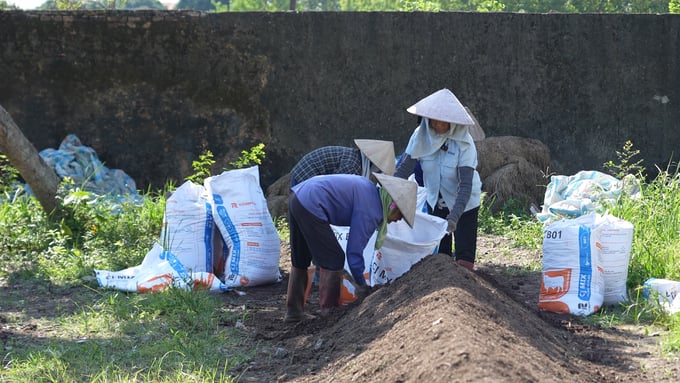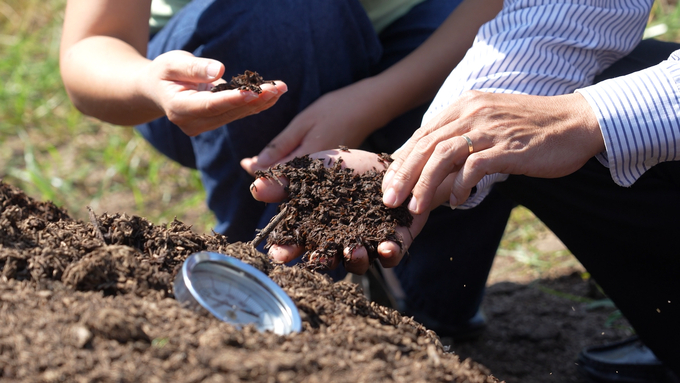November 28, 2025 | 04:16 GMT +7
November 28, 2025 | 04:16 GMT +7
Hotline: 0913.378.918
November 28, 2025 | 04:16 GMT +7
Hotline: 0913.378.918
The “Correct Fertilizer Usage” project is part of the Global Fertilizer Challenge, an initiative by the U.S. Department of State led and funded by the Foreign Agricultural Service under the U.S. Department of Agriculture (USDA).
The Department of Plant Protection (Ministry of Agriculture and Rural Development) is the owner of the “Correct Fertilizer Usage” project in Vietnam. Additionally, the International Rice Research Institute is responsible for implementing the project over the course of four years.
As part of the project, farmers will receive training on techniques to repurpose rice straw and agricultural byproducts into organic fertilizers. Consequently, this initiative allows rural households to save on costs and labor, increase profits, and protect the environment.

After the composting process is complete, farmers pack the organic fertilizer into bags and apply it directly to their fields. Photo: Duc Minh.
The project has been implemented at the Nam Cuong Trading and Services Cooperative (Nam Cuong Cooperative) in Yen Cuong Commune, Y Yen District, Nam Dinh Province since August 2024. After over two months of operation, the project has yielded promising initial results.
According to Nguyen Van Du, Chairman of Nam Cuong Trading and Services Cooperative, local households that utilized IRRI's technology—composting rice straw with a manual mixing machine—achieve a yield of 138 to 300 cubic meters of straw per harvest. Notably, farmers reported a composting time of approximately 45 days, which is half the time required for traditional composting methods (manual or loader-based composting).
Additionally, the project provided local households with mixing equipment and technical guidance, significantly reducing labor needs. Typically, a minimum of 10 workers is required to mix fertilizer manually; with the introduction of the project, only a single worker is needed to operate the machine.
Nguyen Thi Ngan, a member of Nam Cuong Cooperative, noted that the direct application of phosphate and manure is less effective compared to the project's organic fertilizer composting and mixing process.

The organic fertilizer developed a coffee-brown hue and no longer emanates any odor after 2.5 months of composting. Photo: Duc Minh.
Nguyen Thi Ngan previously purchased phosphate, nitrogen, and potassium fertilizers to feed her crops, which resulted in substantial input costs. After receiving training from Nam Cuong Cooperative and IRRI on the new organic composting process, her family repurposed straw and livestock byproducts into fertilizer, cutting costs and boosting profitability considerably.
“Vegetables fertilized with the project’s organic compost are greener, taste sweeter, and pest levels have dropped significantly. Excessive use of chemical fertilizers can harden the soil. However, the effectiveness of organic fertilizer becomes more apparent the more we use, which has motivated local farmers even further,” Ngan added.
According to Tran Ngoc Mai, an IRRI officer, Vietnam faces significant soil degradation and depletion issues. As a result, correct and responsible fertilizer usage is key to restoring soil health.
“When farmers recognize the benefits on crops and soil, they will be encouraged to expand these practices to their communities and neighboring provinces,” Tran Ngoc Mai emphasized.
Hoang Duc Han, Head of Crop Production at the Nam Dinh Province's Department of Crop Production and Plant Protection, noted that the province is committed to developing clean and organic farming models. Furthermore, it currently promotes the use of organic fertilizer through various training sessions. Accordingly, these programs aim to raise farmers’ awareness regarding fertilizers and increase their adoption of straw and byproduct composting practices.
“Through various collaboration activities with IRRI, Nam Dinh’s farmers will have the opportunity to improve incomes and protect the environment. We hope that, following Yen Cuong, many other communes in the province will be able to produce organic fertilizer from straw and other agricultural byproducts,” Hoang Duc Han noted.
Praising straw recycling as “an excellent model,” Hoang Duc Han expressed hope that its success will encourage local farmers to increase organic fertilizer usage, thereby creating a closed-loop system and advancing green, circular agriculture.
The project, scheduled for implementation from 2024 to 2027, will receive support in terms of technical expertise from USDA, IRRI, and Vietnamese scientists. The project's primary beneficiaries encompass all farmers in the project’s designated provinces, who will gain access to advanced technologies and precision farming practices. Ultimately, it aims to optimize the use of agricultural inputs, including rice fertilizer, and expand successful models across the country.
Translated by Nguyen Hai Long

(VAN) According to Mr. Vo Minh Thanh, Director of the Tay Ninh Department of Agriculture and Environment, Resolution 57 has created a new development pathway for the locality, shifting from traditional toward modern agriculture.
/2025/11/26/4909-2-154329_878.jpg)
(VAN) Pearl grouper farming in HDPE cages not only delivers economic efficiency but also contributes to protecting the environment, creating jobs, and promoting marine-based experiential tourism.

(VAN) The model of making a living under the forest canopy through the agroforestry system in Van Son commune, Bac Ninh province, is expected to generate an annual income of approximately VND 30 million/ha.

(VAN) Many enterprises in Can Tho are harnessing natural energy and reducing greenhouse gas emissions in their production processes, thereby contributing to the promotion of a sustainable green transition.
/2025/11/24/3536-2-112800_176.jpg)
(VAN) Dong Nai now has tens of thousands of hectares of forests certified for sustainable management, and this area will continue to be expanded in the coming period.

(VAN) Vinh Ha hamlet (Dai Xuyen commune, Hanoi) is shifting away from small-scale farming as households adopt bioscurity into their breeder chicken models.

(VAN) Heavy rains make aquatic species more vulnerable to disease. Proactive water management and high-tech systems help farmers prevent outbreaks and protect yields.